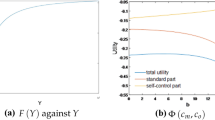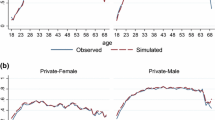Abstract
In the presence of means tested basic income for old age, households will tend to reduce precautionary savings to an inefficiently low level. We explore how this might serve as a justification for a compulsory public pension system. In a representative agent framework with two income types, compulsory savings are found to be Pareto-improving up to a point. Beyond that point, increases in contribution rates simply result in increasingly regressive (implicit) taxation. Similar results are found for pay-as-you-go pensions. On the basis of our model we argue that the introduction of a funded pension component may help the German pension system to cope with demographic change more efficiently.
Similar content being viewed by others
References
Aaron, H. (1966). "The Social Insurance Paradox." Canadian Journal of Economics and Political Science 32, 371–374.
Bernheim, B. D. (1991). "How Strong Are Bequest Motives? Evidence Based on Estimates of the Demand for Life Insurance and Annuities." Journal of Political Economy 99, 899–927.
Breuer, D. and D. Engels. (1999). Grundinformation und Daten zur Sozialhilfe, Gutachten des ISG Instituts für Sozialforschung und Gesellschaftspolitik, Bundesministerium für Arbeit und Sozialordnung, Köln.
Breyer, F. (1989). "On the Intergenerational Pareto Efficiency of Pay-as-you-go Financed Pension." Journal of Institutional and Theoretical Economics 145, 643–658.
Browning, E. K. (1975). "Why the Social Insurance Budget is Too Large in a Democracy." Economic Inquiry 13(3), 373–388.
Cremer, H. and P. Pestieau (1998). "Social Insurance, Majority Voting and Labor Mobility." Journal of Public Economics 68, 397–420.
Feist, H. (2000). Arbeit statt Sozialhilfe. Zur Reform der Grundsicherung in Deutschland, Mohr Siebeck, Tübingen.
Feldstein, M. (1985). "The Optimal Level of Social Security Benefits." Quarterly Journal of Economics 10(2), 303–320.
Feldstein, M. (1995). "Would Privatizing Social Security Raise Economic Welfare?" NBER Working Paper No. W5281.
Fenge, R. (1995). "Pareto-efficiency of the Pay-as-you-go Pension System with Intragenerational Fairness." Finanzarchiv, N.F. 52, 357–363.
Hayek, F. A. von. (1960). The Constitution of Liberty, Chicago: University of Chicago Press.
Homburg, S. (1990). "The Efficiency of Unfunded Pension Schemes." Journal of Institutional and Theoretical Economics 146, 640–647.
Homburg, S. and W. F. Richter. (1989). "Eine effizienzorientierte Reform der GRV." In B. Felderer (ed.), Bevölkerung und Wirtschaft, 183–191, Berlin: Duncker & Humblot.
Hubbard, R. G. and K. L. Judd. (1987). "Social Security and Individual Welfare: Precautionary Saving, Borrowing Constraints, and the Payroll Tax." American Economic Review 77, 630–646.
Hubbard, R. G., J. Skinner and S. P. Zeldes. (1995). "Precautionary Saving and Social Insurance." Journal of Political Economy 103, 360–399.
Kotlifkoff, L. J., K. A. Smetters and J. Walliser. (1998). "Opting out of Social Security and Adverse Selection." NBER Working Paper No. W6430.
Laibson, D. (1997). "Golden Eggs and Hyperbolic Discounting." Quarterly Journal of Economics 112, 443–477.
Laitner, J. (1988). "Bequests, Gifts, and Social Security." Review of Economic Studies 55, 275–299.
Lindbeck, A. and J. W. Weibull. (1988). "Altruism and Time Consistency: The Economics of Fait Accompli." Journal of Political Economy 96, 1165–1182.
Mulligan, C. B. and X. Sala-i-Martin. (1999). "Social Security in Theory and Practice (II): Efficiency Theories, Narrative Theories, and Implications for Reform." NBER Working Paper No. W7119.
Sjoblom, K. (1985). "Voting for Social Security." Public Choice 45, 225–240.
Wissenschaftliche Beirat beim Bundesministerium fürWirtschaft. (1998). Grundlegende Reform der Gesetzlichen Rentenversicherung, Bundesministerium für Wirtschaft, Bonn.
Author information
Authors and Affiliations
Rights and permissions
About this article
Cite this article
Fenge, R., Weizsäcker, J.V. Compulsory Savings: Efficiency and Redistribution On the Interaction of Means Tested Basic Income and Public Pensions. International Tax and Public Finance 8, 637–652 (2001). https://doi.org/10.1023/A:1011288906838
Issue Date:
DOI: https://doi.org/10.1023/A:1011288906838




